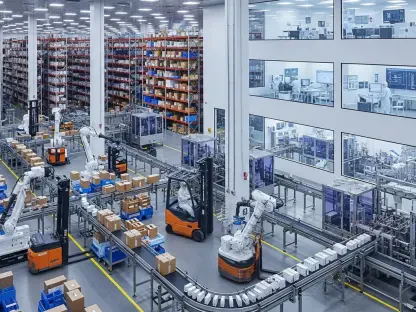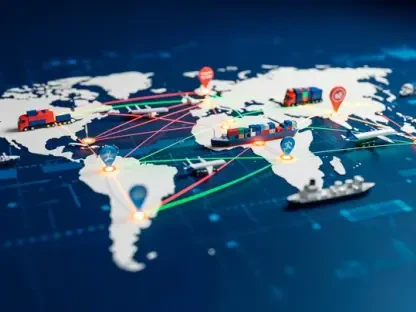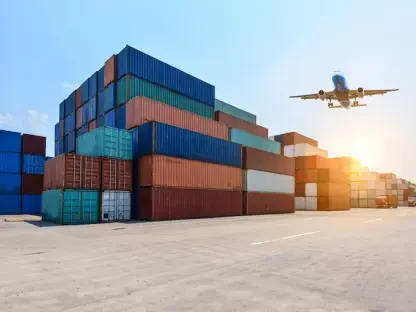Blockchain technology, initially conceived for cryptocurrency transactions, is now emerging as a game-changer for healthcare logistics. Its adoption is set to address long-standing challenges in medical supply and equipment management. This article delves into how blockchain can streamline these processes, highlighting its applications, benefits, and the hurdles in its integration.
Understanding Blockchain in Healthcare Logistics
How Blockchain Works in Healthcare Logistics
Blockchain operates as a decentralized and immutable digital ledger, recording every transaction across a network. This ensures a secure, transparent, and traceable system for managing medical supplies and equipment. The system spans from manufacturers to healthcare providers and eventually to patients.
Blockchain’s decentralized nature eliminates the need for a central authority, thus distributing power among all participants in the network. Each transaction, or block, is linked to previous ones, making it immutable and fostering an environment of trust. The permanence and transparent nature of blockchain transactions reduce the risk of counterfeit products and errors in the supply chain. This secure and accountable structure enables better management and traceability of medical supplies, ensuring they safely reach the end-users.
Moreover, every block in the blockchain is encrypted with a unique cryptographic signature, enhancing the security and integrity of data. This creates a tamper-resistant environment where each entry is verified by multiple participants before being appended to the chain. Such a system is vital in healthcare logistics, where the accuracy and reliability of data are critical. The immutable nature of blockchain data ensures that any attempt to alter information can be easily detected, thus deterring fraud and corruption in the medical supply chain.
Key Benefits of Blockchain in Healthcare Logistics
Enhanced Traceability: Blockchain allows real-time recording and verification of transactions, significantly reducing the possibility of counterfeit products infiltrating the supply chain.
The transparency that blockchain offers is revolutionary in ensuring that each transaction is immediately recorded and available for verification. This means that stakeholders can trace the origins and journey of each product, adding a crucial layer of accountability. By providing a permanent and tamper-proof history of transactions, blockchain minimizes the risk of counterfeit medications and ensures that all products are safe for use.
Improved Inventory Management: The accurate and up-to-date records minimize waste and ensure critical items remain in stock.
Blockchain’s ability to provide real-time information about inventory levels means that healthcare providers can manage their stock more effectively. This capability is essential for minimizing waste, as it helps to ensure that supplies are used before they expire. Accurate inventory records mean that stock replenishment can be done proactively, avoiding situations where critical medical supplies run out unexpectedly. By optimizing inventory management, healthcare facilities can save costs and improve their operational efficiency.
Key Applications of Blockchain in Healthcare Logistics
Pharmaceutical Supply Chain Management
The pharmaceutical industry faces immense challenges in maintaining the authenticity and quality of drugs. Blockchain creates a permanent record of a drug’s journey from manufacturer to patient.
Blockchain mitigates the risk of counterfeit drugs entering the market by ensuring every transaction is verifiable. For instance, Merck, SAP, and AmerisourceBergen have collaborated on a blockchain-based system to enhance drug tracking and safety.
Maintaining proper handling and storage conditions is critical. With blockchain, every phase of the drug’s journey is documented, from manufacturing to distribution, ensuring optimal conditions and reducing the risk of compromised medication.
In an industry where patient safety is paramount, blockchain’s traceability ensures that healthcare providers and patients can trust the authenticity and quality of the drugs they use. This technology functions as more than just a regulatory requirement; it becomes a cornerstone for maintaining the integrity and effectiveness of treatments. It allows all parties involved to verify that the correct processes have been followed, from proper storage temperatures to timely, accurate delivery.
Medical Equipment Tracking
Healthcare facilities often grapple with managing inventories of medical equipment. Blockchain offers real-time tracking, from large imaging machines to small surgical instruments.
This real-time tracking reduces losses and thefts, ensuring timely maintenance and optimizing equipment utilization. GE Healthcare, for example, has partnered with Chronicled to develop a blockchain-based tracking system, improving asset management and patient safety.
Additionally, blockchain streamlines procurement processes by providing accurate records of every equipment’s lifecycle. This record-keeping aids in timely procurement and reduces administrative overheads.
Ensuring that medical equipment is always operational and available is crucial for delivering quality healthcare. By tracking the usage and maintenance schedules of each piece of equipment, blockchain helps healthcare facilities maximize their return on investment and improve patient outcomes. The ability to quickly and accurately document every interaction with medical equipment also plays a significant role in compliance with healthcare regulations.
Vaccine Distribution and Cold Chain Logistics
The COVID-19 pandemic highlighted the need for efficient vaccine distribution. Blockchain manages the complex logistics involved, particularly for vaccines requiring strict temperature controls.
IBM’s Blockchain-based Vaccine Distribution Network ensures end-to-end traceability of vaccine shipments, maintaining proper storage conditions and preventing wastage. This traceability also ensures that every dose administered is safe and effective.
Blockchain enhances the equitable distribution of vaccines by providing transparent data on stock levels and distribution. This transparency reduces hoarding and ensures that vaccines reach those in need promptly.
The ability to monitor and manage the cold chain logistics of vaccines through blockchain is especially vital in ensuring the vaccines’ efficacy. Any break in the required temperature range can render a vaccine ineffective. Blockchain technologies offer a reliable way to confirm that such conditions are consistently met throughout the distribution process, thus maintaining vaccine efficacy and patient safety.
Integration of Blockchain with Healthcare IoT
Enhancing Healthcare IoT with Blockchain
IoT devices are increasingly used in healthcare for remote patient monitoring and equipment management. Blockchain offers a tamper-proof record of data collected from these devices.
This tamper-proof record ensures data integrity, enhancing patient care through accurate, real-time health data. Improved equipment performance monitoring and increased data security are other significant benefits.
Companies like IoTeX are leading efforts to combine blockchain with IoT. This integration addresses the challenges of data security and confidentiality, providing a more reliable healthcare ecosystem.
By integrating IoT devices with blockchain, healthcare providers can access a more comprehensive and accurate patient data set. This setup improves patient monitoring and outcomes by enabling healthcare professionals to offer more personalized and timely interventions. The tamper-proof nature of blockchain also ensures that the collected data remains unaltered and credible, furthering trust in remote patient management technologies.
Regulatory Compliance and Data Privacy
The healthcare industry is heavily regulated. Blockchain implementations must meet legal standards, such as HIPAA in the United States.
Interoperability between blockchain systems and existing healthcare IT infrastructures is crucial. These systems need to work seamlessly across various organizations and platforms to be effective.
Data privacy concerns persist, despite blockchain’s enhanced security. Clear guidelines and regulations are needed to resolve issues around data privacy and ownership, ensuring that patient information remains confidential.
Meeting regulatory compliance requirements is critical, but the scalable and adaptable nature of blockchain can help navigate this complexity. By ensuring that blockchain solutions adhere to regional and international legal standards, healthcare providers can implement these technologies while staying compliant with data security and privacy laws. This compliance further strengthens the trust and reliability that blockchain-based systems bring to healthcare logistics.
Real-World Examples and Recent Developments
MediLedger and Pharmaceutical Supply Chain
MediLedger, a blockchain network by Chronicled, focuses on the pharmaceutical supply chain. It prevents counterfeit drugs and streamlines medicine verification.
Participants like Pfizer and Biogen are part of the DSCSA Interoperability Pilot Project, using blockchain to enhance drug supply chain security. This initiative highlights the growing interest and investment in blockchain for pharmaceutical logistics.
The MediLedger project offers a pragmatic example of how blockchain can be implemented to tackle specific industry challenges. By creating a secured and immutable record of pharmaceutical transactions, MediLedger ensures that only authenticated and approved drugs are distributed in the market. Such initiatives reveal how blockchain can become a critical tool in achieving regulatory compliance and industry standards while enhancing overall drug safety and efficacy.
Vaccine Traceability and Blockchain
Blockchain technology is originally developed for handling cryptocurrency transactions, but it is now poised to revolutionize healthcare logistics. This innovation has the potential to solve long-standing issues in managing medical supplies and equipment. By leveraging blockchain’s unique capabilities, the healthcare sector can streamline various processes, ensuring more efficient and transparent operations.
One of the standout benefits of blockchain is its ability to create a decentralized ledger, which records every transaction in a highly secure and immutable manner. For healthcare logistics, this means improved traceability of medical supplies from manufacturers to end-users. Hospitals and clinics can verify the authenticity and integrity of medical products, reducing the risk of counterfeit items entering the supply chain.
Moreover, blockchain can enhance inventory management by providing real-time data on stock levels and usage. This leads to better demand forecasting and minimizes waste, ensuring that critical supplies are available when needed.
However, integrating blockchain into healthcare logistics is not without its challenges. The technology requires significant investment and a shift in the current digital infrastructure. Additionally, issues related to data privacy, regulatory compliance, and interoperability with existing systems must be addressed.
Despite these hurdles, the promise of blockchain technology in healthcare logistics is undeniable. It heralds a future where supply chains are more secure, transparent, and efficient, ultimately contributing to better patient care.









